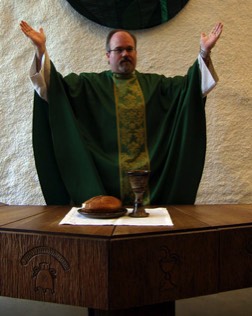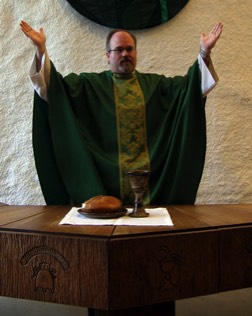Holy Communion: The Amazing Means of Grace:

In Communion Theology Resources will be found articles, papers, sermons, and other discourses pertaining to the meaning of the Eucharist in Christian faith and history.
In Communion Liturgy Resources will be found Eucharistic rituals from the United Methodist and Anglican traditions, as well as liturgies which I have written for use in worship.
In Communion Video Resources will be found links to videos of Eucharists which I have celebrated.
In Communion Celebration Lab will be found a tutorial containing suggestions for clergy to help them develop a clean, worshipful, intentional, and effective method for presiding at the Sacrament. Attention will be given to celebration styles for use in both traditional and non-traditional services.

The Means of Grace are the instruments by which God communicates to us the justifying, sanctifying, and perfecting grace of our Lord Jesus Christ. There are many means of grace; principle among those that have been traditionally identified are: prayer, fasting, worship, preaching, the study of the scriptures, fellowship, service, giving, and the historic dominical sacraments of Baptism and Holy Communion. Through these means of grace -- and, most especially, through the Sacrament of Holy Communion -- God communicates to us the grace of our Lord Jesus Christ. Through the Eucharist we are nourished by the love of God, empowered for mission and ministry, bound together into the body of Christ, and transformed into ever greater likeness of our risen Lord. In the Lord's Supper we meet Jesus, face to face, and partake of his real presence. Suffice it to say, Holy Communion is very important for Christian life, faith, and practice. It is for all of these reasons that a section of Grace Incarnate has been set aside and devoted to explicating the theological meaning, liturgical form, celebration practice, and faithful participation in the Eucharist.
In Communion Theology Resources will be found articles, papers, sermons, and other discourses pertaining to the meaning of the Eucharist in Christian faith and history.
In Communion Liturgy Resources will be found Eucharistic rituals from the United Methodist and Anglican traditions, as well as liturgies which I have written for use in worship.
In Communion Video Resources will be found links to videos of Eucharists which I have celebrated.
In Communion Celebration Lab will be found a tutorial containing suggestions for clergy to help them develop a clean, worshipful, intentional, and effective method for presiding at the Sacrament. Attention will be given to celebration styles for use in both traditional and non-traditional services.
In Communion Theology Resources will be found articles, papers, sermons, and other discourses pertaining to the meaning of the Eucharist in Christian faith and history.
In Communion Liturgy Resources will be found Eucharistic rituals from the United Methodist and Anglican traditions, as well as liturgies which I have written for use in worship.
In Communion Video Resources will be found links to videos of Eucharists which I have celebrated.
In Communion Celebration Lab will be found a tutorial containing suggestions for clergy to help them develop a clean, worshipful, intentional, and effective method for presiding at the Sacrament. Attention will be given to celebration styles for use in both traditional and non-traditional services.